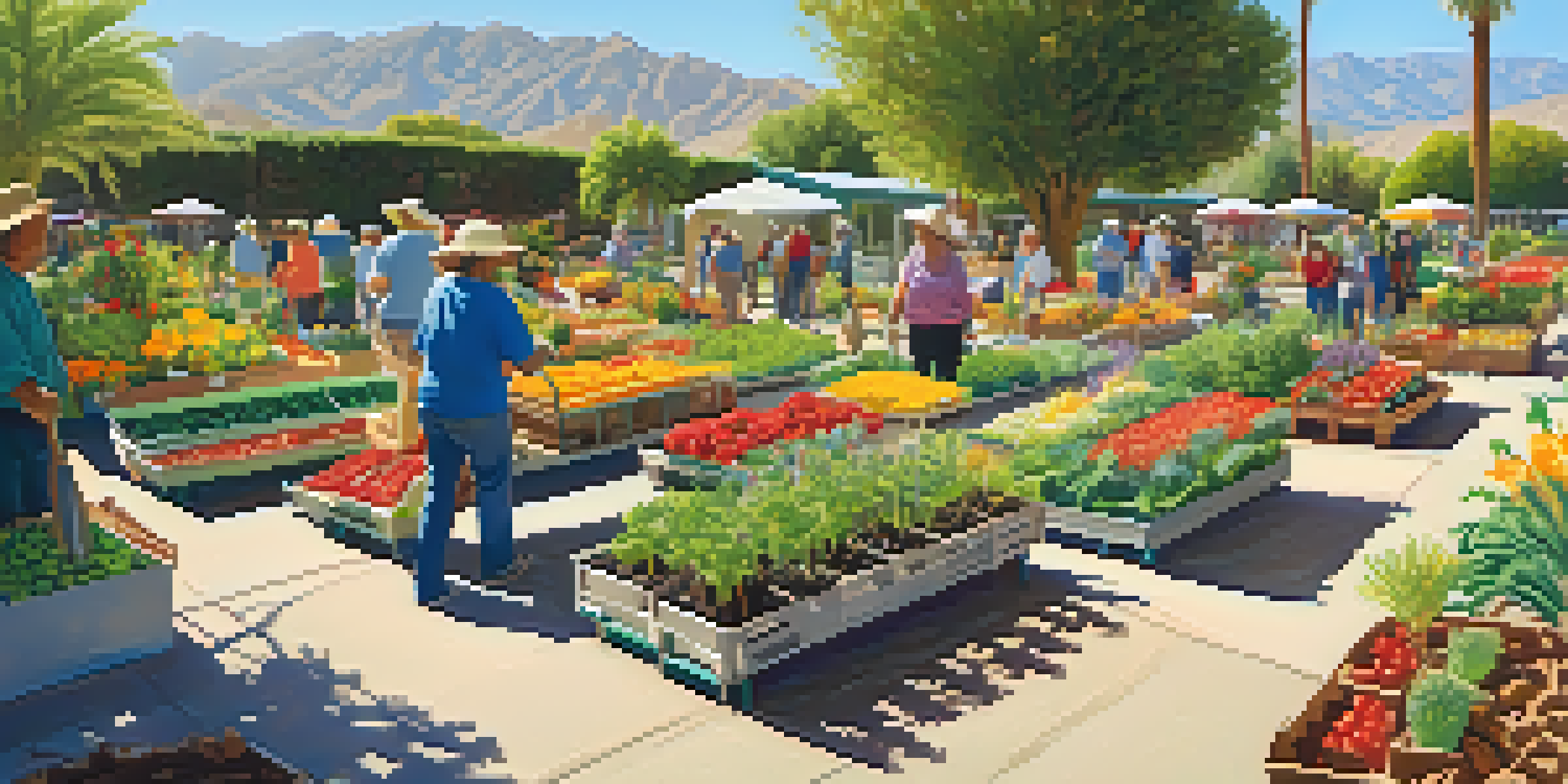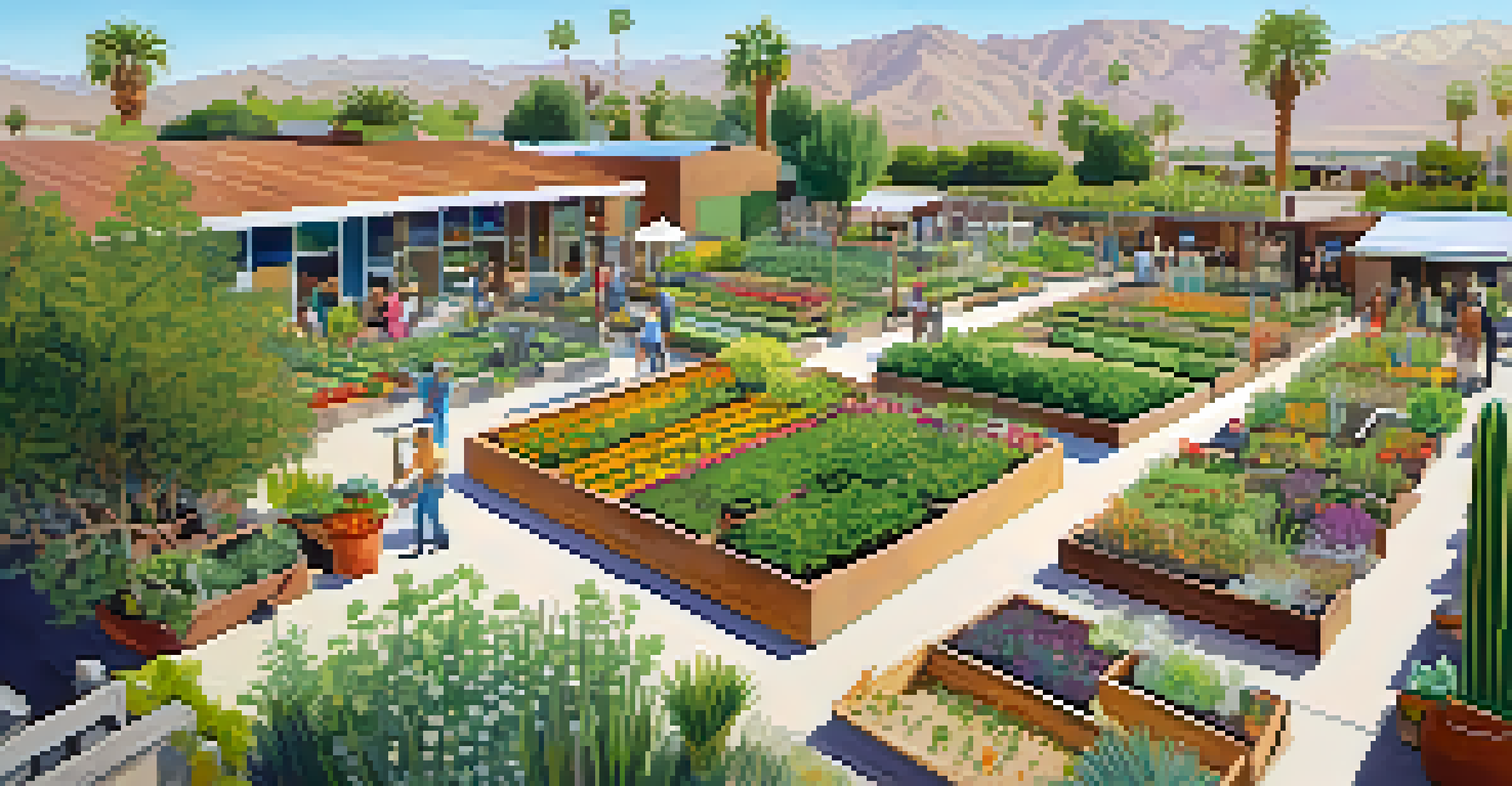Community Gardens: A Source of Local Food in Palm Springs

What Are Community Gardens and Their Benefits?
Community gardens are shared plots of land where people come together to grow fruits, vegetables, and flowers. They serve as a wonderful way for residents to cultivate their own food while fostering a sense of community. In Palm Springs, these gardens not only provide fresh produce but also promote sustainable practices and environmental awareness.
To plant a garden is to believe in tomorrow.
One of the key benefits of community gardens is that they encourage individuals to connect with nature and learn about gardening techniques. This hands-on experience can be particularly enriching, especially for those who may not have access to private outdoor space. By working together, community members enhance their gardening skills while sharing tips and tricks.
Moreover, these gardens can help reduce food deserts in urban areas where access to fresh produce is limited. By cultivating their own food, residents can save money while improving their overall health. In essence, community gardens are about more than just food; they are about building relationships and enhancing quality of life.
The Rise of Community Gardens in Palm Springs
In recent years, Palm Springs has seen a flourishing of community gardens, reflecting a growing interest in local food production. The city has embraced these gardens as a way to enhance food security and promote sustainability. Local organizations and volunteers have come together to create beautiful garden spaces that anyone can enjoy.

The city's warm climate is perfect for growing a variety of crops year-round, making community gardens a viable option for many residents. This has led to a diverse planting palette, with everything from tomatoes to herbs thriving in the sandy soil. The result is an abundance of fresh produce that residents can enjoy right in their own backyards.
Community Gardens Enhance Well-Being
These gardens foster connections among residents while promoting healthy eating and sustainable practices.
As more people become aware of the benefits of community gardens, the movement continues to gain momentum. From workshops to volunteer days, these gardens are becoming hubs of activity and education in Palm Springs. They serve as reminders of the importance of local food systems and the power of community.
How to Get Involved in Palm Springs Community Gardens
Getting involved in a community garden in Palm Springs is easier than you might think. Many gardens welcome new members and often have plots available for residents to cultivate. Connecting with local gardening groups or checking online platforms can help you find the perfect garden to join.
The best time to plant a tree was twenty years ago. The second best time is now.
In addition to taking on a plot, there are various ways to contribute, such as volunteering for maintenance, participating in workshops, or even donating supplies. Each garden has its own unique community vibe, so it’s a great opportunity to meet like-minded individuals who share a passion for gardening and sustainability.
Whether you're a seasoned gardener or a newbie, there’s a place for you in these green spaces. Engaging in community gardening can enrich your life, promote healthy eating, and foster friendships. Plus, there's nothing quite like the satisfaction of harvesting your own food!
Success Stories from Palm Springs Community Gardens
Across Palm Springs, there are numerous success stories emerging from community gardens that highlight their positive impact. For instance, one community garden started as an empty lot and has transformed into a lush oasis filled with vegetables and flowers. This garden has not only provided food but also served as a gathering place for workshops and social events.
Another inspiring tale comes from a local youth program that partners with a community garden to teach children about food production. Through hands-on activities, kids learn valuable skills like planting seeds and caring for crops, fostering appreciation for healthy eating. This initiative has empowered a new generation to embrace gardening and sustainability.
Palm Springs Gardens Are Thriving
The rise of community gardens in Palm Springs reflects a growing interest in local food production and community engagement.
These stories illustrate how community gardens are not just about growing food; they’re about growing community ties and enhancing the lives of residents. Through collaboration and shared goals, these gardens have become vital components of Palm Springs' social fabric, promoting health, education, and well-being.
The Environmental Impact of Community Gardening
Community gardens play a significant role in promoting environmental sustainability in Palm Springs. By growing food locally, they reduce the carbon footprint associated with transporting produce from far-off places. This practice not only conserves resources but also ensures fresher, tastier food for everyone involved.
Additionally, these gardens help to enhance urban biodiversity by providing habitats for various species, including pollinators like bees and butterflies. The diverse plant life fosters a balanced ecosystem, which is essential for maintaining healthy soil and water systems. Essentially, community gardens act as green lungs for the city, promoting ecological health.
Incorporating sustainable practices, such as composting and organic gardening methods, further amplifies their positive environmental impact. As residents learn and adopt these techniques, they contribute to a more sustainable future. Community gardens in Palm Springs are not just about food; they’re about nurturing the planet.
Challenges Faced by Community Gardens
Despite their many benefits, community gardens in Palm Springs face several challenges. One major issue is securing funding and resources to maintain the gardens. Many rely on grants, donations, and volunteer work, which can fluctuate over time, making sustainability a constant concern.
Another challenge is the ongoing battle against urban development. As cities grow, green spaces are often at risk of being replaced by new construction. Advocates for community gardens must work hard to raise awareness about their importance and push for policies that protect these vital green spaces.
Environmental Benefits of Gardening
Community gardens contribute to environmental sustainability by reducing carbon footprints and enhancing urban biodiversity.
Moreover, community gardens require ongoing commitment from participants to thrive. Issues such as inconsistent attendance and lack of organization can hinder their success. However, with strong leadership and a dedicated community, many of these challenges can be addressed and overcome.
The Future of Community Gardens in Palm Springs
The future of community gardens in Palm Springs looks bright, with increasing interest and support for local food initiatives. As residents continue to recognize the numerous benefits of gardening, we can expect to see more gardens sprouting up across the city. This growth not only contributes to food security but also strengthens community bonds.
Moreover, as awareness of environmental issues rises, community gardens will likely play a crucial role in promoting sustainable practices. By serving as educational hubs, they can teach residents about eco-friendly gardening methods and the importance of local food systems. This knowledge can inspire even more people to get involved and make a difference.

Ultimately, the ongoing success of community gardens will depend on community engagement, support, and advocacy. By coming together to nurture these green spaces, residents of Palm Springs can create a lasting legacy of health, sustainability, and connection. The journey of community gardening is just beginning, and its potential is limitless.